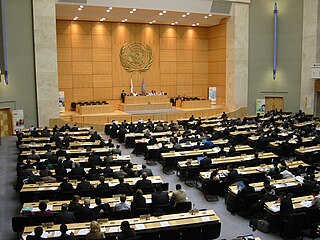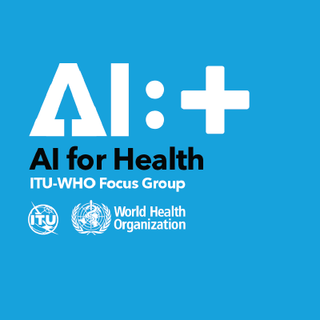Related Research Articles
The International Telecommunication Union Telecommunication Standardization Sector (ITU-T) is one of the three Sectors (branches) of the International Telecommunication Union (ITU). It is responsible for coordinating standards for telecommunications and Information Communication Technology, such as X.509 for cybersecurity, Y.3172 and Y.3173 for machine learning, and H.264/MPEG-4 AVC for video compression, between its Member States, Private Sector Members, and Academia Members.

The International Telecommunication Union (ITU) is a specialized agency of the United Nations responsible for many matters related to information and communication technologies. It was established on 17 May 1865 as the International Telegraph Union, significantly predating the UN and making it the oldest UN agency. Doreen Bogdan-Martin is the Secretary-General of ITU, the first woman to serve as its head.
Telecommunications in Sudan includes fixed and mobile telephones, the Internet, radio, and television. Approximately 12 million out of 45 million people in Sudan use the Internet, mainly on smartphones and mobile computers.

The United Nations Foundation is a charitable organization headquartered in Washington, D.C., that supports the United Nations and its activities. It was established in 1998 with a $1 billion gift to the United Nations by philanthropist Ted Turner, who believed the UN was crucial for addressing the world's problems. Originally primarily a grantmaker, the UN Foundation has evolved into a strategic partner to the UN, mobilizing support to advance the Sustainable Development Goals (SDGs), and help the UN address issues such as climate change, global health, gender equality, human rights, data and technology, peace, and humanitarian responses. The UN Foundation's main work occurs through building public-private partnerships, communities, initiatives, campaigns, and alliances to broaden support for the UN and solve global problems. The UN Foundation has helped build awareness and advocate for action on, among others, antimicrobial resistance, regional action on climate change, local implementation of the SDGs, as well as global campaigns such as Nothing But Nets against malaria, the Measles & Rubella Initiative, the Clean Cooking Alliance, Girl Up, Shot@Life, and the Digital Impact Alliance, among others. In March 2020, the UN Foundation was also a key founder of the COVID-19 Solidarity Response Fund on behalf of the World Health Organization (WHO), helping to raise over $200 million USD within the first six weeks to support the global response to the COVID-19 pandemic.
Telecommunications in Tunisia includes telephones, radio, television, and the Internet. The Ministry of Communication Technologies, a cabinet-level governmental agency, is in charge of organizing the sector.

The World Summit on the Information Society (WSIS) was a two-phase United Nations-sponsored summit on information, communication and, in broad terms, the information society that took place in 2003 in Geneva and in 2005 in Tunis. WSIS Forums have taken place periodically since then. One of the Summit's chief aims is to bridge the global digital divide separating rich countries from poor countries by increasing internet accessibility in the developing world. The conferences established 17 May as World Information Society Day.

Freedom of information is freedom of a person or people to publish and have access to information. Access to information is the ability for an individual to seek, receive and impart information effectively. As articulated by UNESCO, it encompasses
"scientific, indigenous, and traditional knowledge; freedom of information, building of open knowledge resources, including open Internet and open standards, and open access and availability of data; preservation of digital heritage; respect for cultural and linguistic diversity, such as fostering access to local content in accessible languages; quality education for all, including lifelong and e-learning; diffusion of new media and information literacy and skills, and social inclusion online, including addressing inequalities based on skills, education, gender, age, race, ethnicity, and accessibility by those with disabilities; and the development of connectivity and affordable ICTs, including mobile, the Internet, and broadband infrastructures".

Information and communications technology (ICT) is an extensional term for information technology (IT) that stresses the role of unified communications and the integration of telecommunications and computers, as well as necessary enterprise software, middleware, storage and audiovisual, that enable users to access, store, transmit, understand and manipulate information.
The World Summit Awards (WSA) rewards Information and Communications Technologies projects that have a positive impact on society at the local level. The award was initiated in 2003, within the framework of the United Nations World Summit on the Information Society. After the UN General Assembly adopted Resolution 56/183. The awards are open to companies, organizations, or individuals from any of the UN and the UNESCO Member States. They are divided into 8 different categories. The world summit awards are managed by the International Center for New Media (ICNM), a non-profit organization based in Salzburg, Austria. ICNM was founded by Peter A. Bruck, in 2002.

The Internet Governance Forum (IGF) is a multistakeholder governance group for policy dialogue on issues of Internet governance. It brings together all stakeholders in the Internet governance debate, whether they represent governments, the private sector or civil society, including the technical and academic community, on an equal basis and through an open and inclusive process. The establishment of the IGF was formally announced by the United Nations Secretary-General in July 2006. It was first convened in October–November 2006 and has held an annual meeting since then.

Nick Ashton-Hart is the Geneva Representative of the Digital Trade Network (DTN) and represents the ICC United Kingdom on the UK delegation to the meetings of the International Telecommunication Union. He has served in various capacities as the representative of the technology sector to the UN and its member-state delegations in Geneva for more than a decade, including with the Computer & Communications Industry Association (CCIA). Prior to that he was senior director for participation and engagement and director for at-large at the Internet Corporation for Assigned Names and Numbers (ICANN).
The Broadband Commission for Sustainable Development was established in May 2010 as a joint initiative by the International Telecommunication Union (ITU) and the United Nations Educational, Scientific and Cultural Organization (UNESCO) to promote Internet access, in particular, broadband networks in order to help achieve United Nations development goals, such as the Millennium Development Goals. The Commission was renamed the Broadband Commission for Sustainable Development, following the adoption of the UN's Sustainable Development Goals in September 2015.
Global Internet usage is the number of people who use the Internet worldwide.

Houlin Zhao is a Chinese engineer who served as the Secretary-General of the International Telecommunication Union (ITU) from 2015 to 2022. He was first elected at the 2014 Plenipotentiary Conference in Busan, and re-elected at the 2018 Plenipotentiary Conference in Dubai. ITU is the specialized United Nations Agency for Information and Communication Technology (ICT), working on promotion, collaboration, and standardization.

Doreen Bogdan-Martin is an international civil servant and current Secretary-General of the International Telecommunication Union. She was elected at the 2022 ITU Plenipotentiary Conference in Bucharest, and as the first woman in the 157-year history of the ITU to become the Secretary-General. Previously, she was the first woman to become an Elected Official of the ITU, as the Director of the Telecommunication Development Bureau of the ITU.
AI for Good is an ongoing webinar series organized by the Standardization Bureau (ITU-T) of the International Telecommunication Union. Its self-declared mission is to use artificial intelligence (AI) to help achieve the UN Sustainable Development Goals (SDGs).

The ITU-WHO Focus Group on Artificial Intelligence for Health is an inter-agency collaboration between the World Health Organization and the ITU, which created a benchmarking framework to assess the accuracy of AI in health.
The Global Digital Compact is an initiative proposed in the United Nations Secretary-General António Guterres's Common Agenda. The objective of this compact is to ensure that digital technologies are used responsibly and for the benefit of all, while addressing the digital divide and fostering a safe and inclusive digital environment. The Global Digital Compact is part of the Pact for the Future, which was discussed and adopted at the UN Summit of the Future in September 2024.

The Digital Cooperation Organization (DCO) is a global multilateral body launched in November 2020. It aims at enabling digital prosperity for all by accelerating the sustainable and inclusive growth of the digital economy and facilitating cooperation in response to the dynamic challenges of the digital era. Created to address the diverse aspects of the digital landscape, the DCO seeks to encourage cooperation among Member States in areas including digital innovation and digital governance. As of January 2024, Member States include Bahrain, Bangladesh, Cyprus, Djibouti, The Gambia, Ghana, Greece, Jordan, Kuwait, Morocco, Nigeria, Oman, Pakistan, Qatar, Rwanda and Saudi Arabia.
References
- ↑ "Connecting the Least Connected: Harnessing Partnerships for Digital Connectivity | 5a.Conferencia de Naciones Unidas sobre los Países Menos Adelantados". www.un.org. Archived from the original on 31 March 2023. Retrieved 31 March 2023.
- ↑ "ITU Partner2Connect Digital Coalition". www.itu.int. Archived from the original on 31 March 2023. Retrieved 31 March 2023.
- ↑ "Partner2Connect". Internet Society. Archived from the original on 31 March 2023. Retrieved 31 March 2023.
- ↑ "Explore the pledges". www.itu.int. Retrieved 31 March 2023.
- ↑ "Partner2Connect Ukraine Pledges". ITU. Retrieved 5 April 2023.